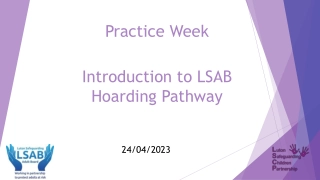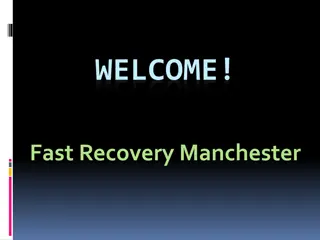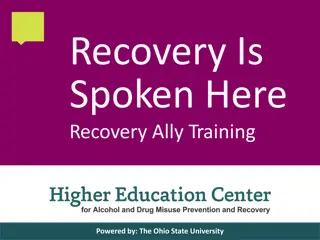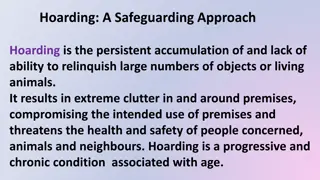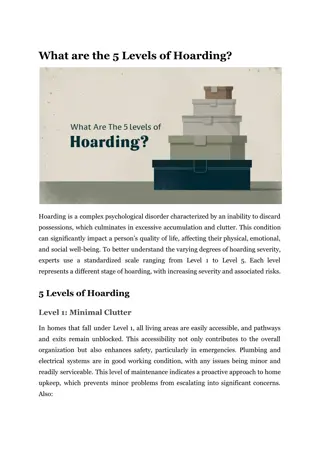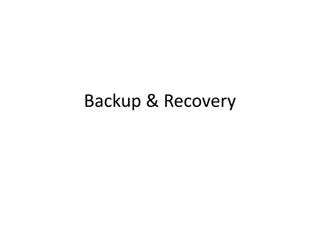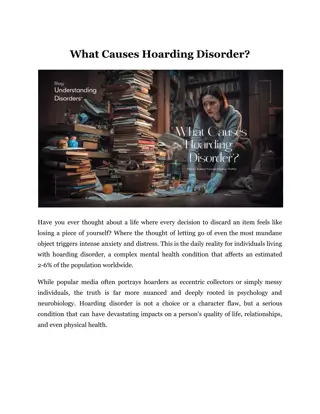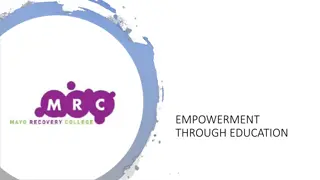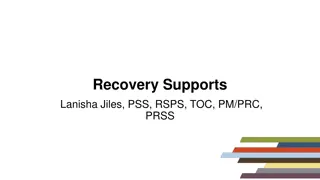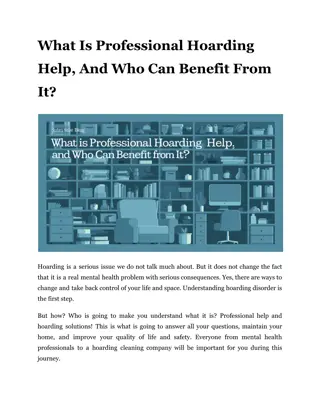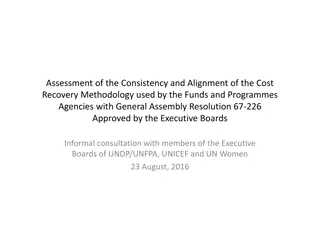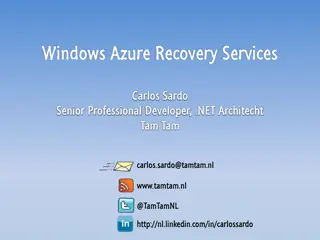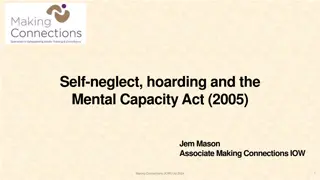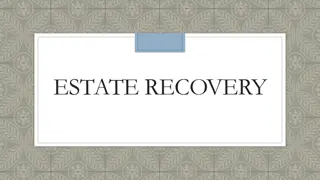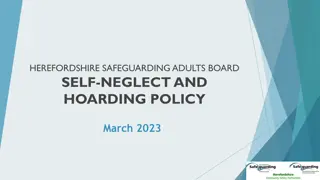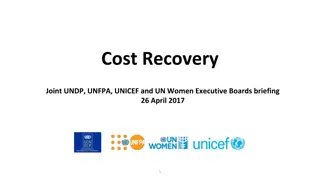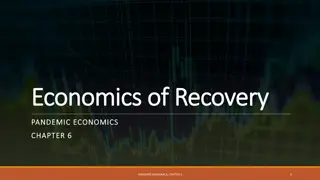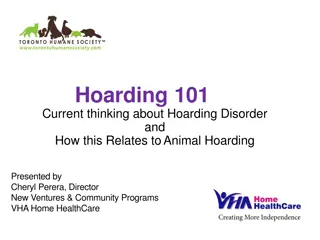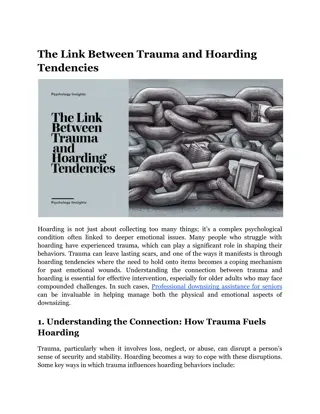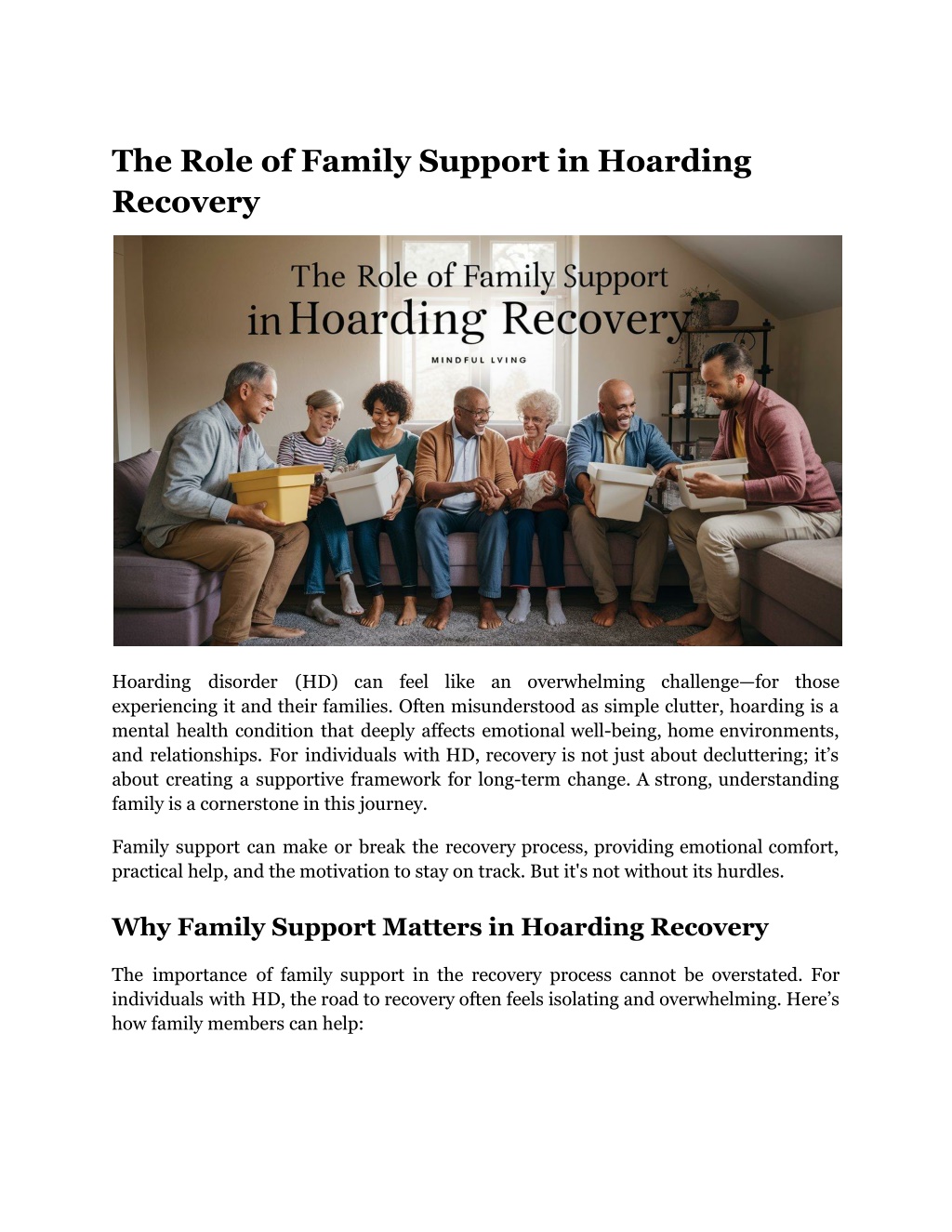
The Role of Family Support in Hoarding Recovery
Discover how family support can help individuals on their journey to overcoming hoarding and rebuilding healthier living spaces.n
Download Presentation

Please find below an Image/Link to download the presentation.
The content on the website is provided AS IS for your information and personal use only. It may not be sold, licensed, or shared on other websites without obtaining consent from the author. Download presentation by click this link. If you encounter any issues during the download, it is possible that the publisher has removed the file from their server.
E N D
Presentation Transcript
The Role of Family Support in Hoarding Recovery Hoarding experiencing it and their families. Often misunderstood as simple clutter, hoarding is a mental health condition that deeply affects emotional well-being, home environments, and relationships. For individuals with HD, recovery is not just about decluttering; it s about creating a supportive framework for long-term change. A strong, understanding family is a cornerstone in this journey. disorder (HD) can feel like an overwhelming challenge for those Family support can make or break the recovery process, providing emotional comfort, practical help, and the motivation to stay on track. But it's not without its hurdles. Why Family Support Matters in Hoarding Recovery The importance of family support in the recovery process cannot be overstated. For individuals with HD, the road to recovery often feels isolating and overwhelming. Here s how family members can help:
Emotional Encouragement People struggling with HD often feel shame, anxiety, or frustration about their hoarding behaviors. Family members who provide a judgment-free space can significantly boost confidence and encourage recovery. Practical Assistance Hoarding often involves clutter that may span entire homes. Family members can assist with organizing and sorting belongings in a manageable way, helping the individual feel less daunted by the process. Understanding the Why Behind Hoarding Families who understand hoarding as a disorder not laziness or stubbornness can better empathize and provide more effective support. Education is key to offering this level of understanding. The Challenges of Supporting a Loved One with Hoarding Disorder Despite its importance, family support comes with its own set of challenges: 1. Emotional Strain: Watching a loved one struggle with hoarding can be draining and emotionally taxing for family members. 2. Miscommunication: Families often push for immediate results, which can clash with the slower, more deliberate pace of hoarding recovery. 3. Conflict and Frustration: Shared living spaces filled with clutter often create tension among family members. 4. Burnout: Supporting someone long-term without breaks can lead to caregiver fatigue. Effective Strategies for Families Supporting Hoarding Recovery Family members can transform their good intentions into meaningful action using these strategies:
Educate Yourself Understanding hoarding disorder is the first step. Explore resources like mental health articles, books, or expert webinars. Learn about the emotional attachments and fear of loss that often underpin hoarding behaviors. Use Collaborative Decision-Making Instead of taking charge, involve your loved one in decisions about decluttering. Respect their emotional connections to items, and work together on solutions. Set Small Goals Break down the recovery journey into achievable milestones. Decluttering a single drawer can feel more manageable than tackling an entire room. Celebrate each small victory together. Seek Professional Guidance Engaging therapists or specialists can make a huge difference. Experts trained in cognitive behavioral therapy (CBT) or other treatments offer structured and effective approaches to hoarding recovery. A Deeper Dig into Hoarding Cleaning Services In some cases, families may decide to involve specialized hoarding cleaning services. These services specialize in handling extreme clutter situations and can be an essential part of recovery for those overwhelmed by the physical aspects of hoarding. Why Consider These Services? Expertise: Professionals understand how to clean safely and efficiently while respecting the individual s emotional needs. Health Hazards: Hoarding can lead to serious health risks, including mold, pests, or fire hazards. Cleaning services ensure these are addressed properly. Time-Saving: Tackling hoarding situations often requires significant time and effort, which families may not have.
When Are They Necessary? While hoarding cleaning services provide vital assistance, they work best when combined with ongoing emotional and therapeutic support. Simply clearing the clutter without addressing the underlying mental health issues may lead to relapse. How Family Support Improves Recovery Outcomes When families provide active, informed support, the benefits extend beyond the individual: 1. Increased Therapy Engagement: Individuals with HD are more likely to seek and stick with therapy when family members encourage them. 2. Safer Living Spaces: Family involvement in organizing creates cleaner, safer homes. 3. Stronger Relationships: The collaborative effort of recovery can strengthen familial bonds. 4. Sustained Progress: With ongoing family support, individuals with HD are less likely to relapse into old patterns. Overcoming Common Hurdles Even with the best intentions, families may encounter roadblocks. Here s how to tackle them: Emotional Exhaustion: Build a support network of friends or join a family support group for caregivers of individuals with hoarding disorder. Misunderstandings: Schedule open conversations where everyone can voice their feelings and expectations. Stalled Progress: When things slow down, focus on small wins to maintain positivity and momentum. Building a Supportive Home Environment A supportive home environment is crucial for sustaining recovery from hoarding disorder. Beyond the practicalities of clearing clutter, creating a space that fosters emotional well-being and reinforces positive habits can make a significant difference. Here's how families can help build such an environment:
Encourage Open Communication Regular family discussions about progress, challenges, and goals can help everyone stay on the same page. Approach these conversations with empathy and avoid blame or criticism. Establish Routine Maintenance Work together to set up simple routines for maintaining order. This could include scheduling regular decluttering sessions or designating spaces for specific items. Avoid Creating Pressure While it s natural to want immediate changes, avoid placing undue pressure on your loved one. The focus should be on steady, consistent progress rather than perfection. Conclusion Family support is one of the most impactful tools in hoarding recovery. By offering emotional encouragement, learning about the condition, and working collaboratively, families can create an environment that fosters both emotional and physical transformation. The journey isn t without its challenges, but with the right strategies and occasional professional help like hoarding cleaning services recovery becomes a shared mission. Together, families can empower their loved ones to reclaim their spaces, lives, and well-being. Site Article: The Role of Family Support in Hoarding Recovery

